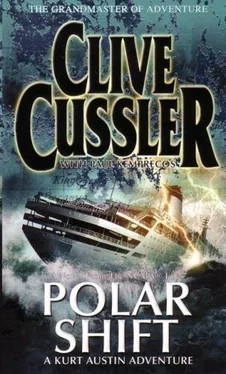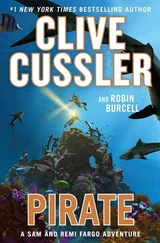"Nonetheless, the Gustloff will again one day transport happy German laborers and party faithful to sunny Italy."
"I can hardly wait. You haven't told me where we're going."
"Far beyond the reach of the Red Army. Your work is too important to fall into Russian hands. The Reich will take good care you.
"It looks as if the Reich is having trouble taking care of its own people."
"A temporary setback. Your welfare is my utmost priority."
"I'm not concerned about my welfare." Kovacs hadn't seen his wife and young son for months. Only their infrequent letters had kept hope alive.
"Your family?" The tall man regarded him with a steady gaze. "Have no worry. This will soon be over. I suggest you get some sleep. No, that's an order."
He stretched out on the bunk, hands clasped behind his head, and shut his eyes. Kovacs was not deceived. His companion seldom slept and could snap fully awake at the slightest provocation.
Kovacs examined the man's face. He could have been in his early twenties, although he looked older. He had the long head and craggy profile portrayed in propaganda posters as the Aryan ideal.
Kovacs shuddered, remembering the cold-blooded way the Russian soldier had been dispatched. The past few days had been a blur. The tall man had arrived at the lab during a snowstorm and produced a document authorizing the release of Dr. Kovacs. He had introduced himself only as Karl, and told Kovacs to gather his belongings. Then came the madcap dash across the frozen countryside and the narrow escapes from Russian patrols. Now this miserable ship.
The food had made Kovacs drowsy. His eyelids drooped, and he drifted off into a deep sleep.
While the professor slept, a squad of military police swept the Gustloff in search of deserters. The ship was cleared for departure, and a harbor pilot came aboard. At around one in the afternoon, the deckhands cast off the mooring lines. Four tugs came alongside and began to pull the ship away from the dock.
A fleet of small boats, loaded mostly with women and children, blocked the way. The ship stopped and took the refugees aboard. The Gustloff normally carried 1,465 passengers, served by a crew of four hundred. As it began this voyage, the once-elegant liner was carrying eight thousand passengers.
The ship headed into the open sea, and dropped anchor late in the afternoon to rendezvous with another liner, the Hansa, to wait for their escorts. The Hansa had developed engine trouble and never showed up. Naval Command was worried that the Gustloff would be exposed to danger in open waters and told the ship to go it alone.
The liner plowed into the whitecapped waters of the Baltic, fighting a stiff northwest wind. Hailstones rattled the windows of the bridge, where Commander Zahn seethed with anger as he looked down at the two so-called escorts that had been sent to protect the liner.
The ship was built for southern climes, but, with any luck, it could survive bad weather. What it could not survive was stupidity. Naval Command had sent the liner into harm's way with an old torpedo boat called the Lowe, or "Lion," and the T19, a worn-out torpedo recovery vessel as escorts. Zahn was thinking that the situation could not get any worse when the T19 radioed that it had developed a leak and was returning to the base.
Zahn went to Captain Petersen and the other officers gathered in the bridge.
"In view of our escort situation, I suggest that we pursue a zigzag course at high speed," he said.
Petersen scoffed at the suggestion. "Impossible. The Wilhelm Gustloff is a twenty-four-thousand-ton ocean liner. We cannot go from one tack to the other like a drunken sailor."
"Then we must outrun any U-boats with our superior speed. We can take the direct, deepwater route at the full speed of sixteen knots."
"I know this ship. Even without the bomb damage to the propeller casings, there would be no way we could reach and maintain sixteen knots without blowing out our bearings," Petersen said.
Zahn could see the veins bulging in the captain's neck. He stared through the bridge windows at the old torpedo boat leading the way. "In that case," he said in a voice that seemed to echo in a tomb, "God help us all."
Professor, wake up." The voice was hard-edged, urgent.
Kovacs opened his eyes and saw Karl bending over him. He sat up and rubbed his cheeks as if he could squeeze the sleep out of them.
"What's wrong?"
"I've been talking to people. My God, what a mess! There are two captains and they fight all the time. Not enough lifeboats. The ship's engines are barely keeping us up to speed. The stupid submarine division ordered the ship to sail with an old torpedo boat escort that looks as if it was left over from the last war. The damned fools have got the ship's navigation lights on."
Kovacs saw an uncharacteristic alarm in the marble features.
"How long have I slept?"
"It's nighttime. We're on the open sea." Karl shoved a dark blue life jacket at Kovacs and slipped into a similar jacket.
"Now what do we do?"
"Stay here. I want to check the lifeboat situation." He tossed Kovacs a pack of cigarettes. "Be my guest."
"I don't smoke."
Karl paused in the open doorway. "Maybe it's time you did." Then he was gone.
Kovacs spilled a cigarette from the pack and lit up. He had quit smoking years ago, when he got married. He coughed as the smoke filled his lungs, and he felt dizzy from the strong tobacco, but he recalled with delicious pleasure the innocent debauchery of his college days.
He finished the cigarette, thought of lighting up another but decided against it. He had not had a bath in days, and his body itched in a dozen places. He washed his face in the sink and was drying his hands on a threadbare towel when there was a knock at the door.
"Professor Kovacs?" a muffled voice said.
"Yes."
The door opened, and the professor gasped. Standing in the doorway was the ugliest woman he had ever seen. She was more than six feet tall, with broad shoulders straining the seams of a black Persian lamb coat. Her wide mouth was painted in bright red lipstick, and, with such heavily rouged lips, she looked like a circus clown.
"Pardon my appearance," she said in an unmistakably male voice. "This is not an easy ship to get aboard. I had to resort to this silly disguise, and a few bribes."
"Who are you?"
"Not important. What is important is your name. You are Dr. Lazlo Kovacs, the great German-Hungarian electrical genius."
Kovacs grew wary. "I am Lazlo Kovacs. I consider myself to be Hungarian."
"Splendid! You are the author of the paper on electromagnetism that electrified the scientific world."
Kovacs's antenna quivered. The paper published in an obscure scientific journal had brought him to the attention of the Germans, who kidnapped him and his family. He said nothing.
"Never mind," the man said genially, the clown smile even broader. "I can see that I have the right man." He reached under his fur coat and pulled out a pistol. "I'm sorry to be rude, Dr. Kovacs, but I'm afraid I'm going to have to kill you."
"Kill me? Why? I don't even know you."
"But I know you. Or, rather, my superiors in the NKGB know you. As soon as our glorious Red Army forces crossed the border we sent a special squad to find you, but you had already left the lab."
"You're Russian?"
"Yes, of course. We would love to have you come and work for us. Had we been able to intercept you before you boarded the ship, you would be enjoying Soviet hospitality. But now I can't get you off the ship, and we can't let you and your work fall into German hands again. No, no. It just wouldn't do." The smile vanished.
Читать дальше












